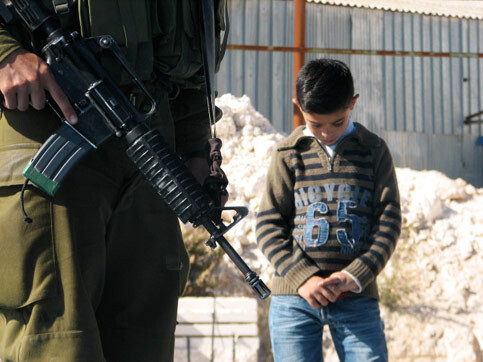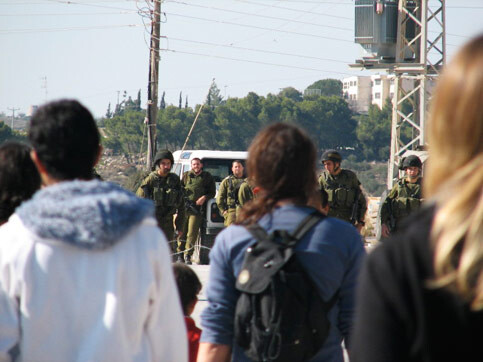West Bank 30 November 2009

An Israeli soldier stands in front of a Palestinian child at one of the weekly demonstrations in al-Masara village in the occupied West Bank.
Today we were clearing land in the Palestinian village of Um Salomona and it is a beautiful crisp, clear fall day. Um Salomona is located in the occupied West Bank’s Bethlehem District and is one of nine villages, with a combined total of 9,000 residents, that borders the illegal Israeli settlement of Efrat. More accurately, Efrat borders the nine Palestinian villages, seeing as they outdate the illegal settlement by hundreds of years. Efrat is the largest part of the Gush Etzion settlement bloc and is the fourth-largest settlement in the occupied West Bank with some 9,000 Israeli settlers. Israel plans for its wall in the West Bank to tuck Efrat comfortably into Israel. A road for settlers which Palestinians are only allowed to use during daylight hours has already been built and cuts Palestinian residents off from their farmland.
Recently, after years of land appropriation and harassing Palestinian villagers, Efrat’s residents have decided that they want to acquire more of Um Salomona’s farmland separated from the village by the main road for a cemetery. Raed, a resident of the village, owns the land targeted by the settlers. He knows all too well that without strong action (and quite possibly, even with strong action) it is likely that his land — like thousands of other acres of Palestinian land in the West Bank — will be seized by the settlement.
So we as international volunteers have responded to his call and the call of the local Popular Committee to work the farmland. We provide a daily reminder that this land, like all the land in historic Palestine, is not, as the colonial Israeli narrative would have us believe, “without a people.” Although our agricultural skills offer little help to this community of farmers, we bring a physical presence, foreign passports and cameras. It is a small degree of witness to curb Israel’s policy of violence to dissuade Palestinians from accessing their land.
Still, the Israeli military comes every day. The green military jeep pulled up literally seconds after our taxi of internationals arrived. They were clearly watching us — a task they perform very well. The soldiers watched us from the side of the road. They summoned Raed and asked him the same questions they ask him every day. Then they walked up to our small group and asked the usual questions: “Where are you from?” “Why are you here?” “How long are you staying here in Israel?” Notice the colonialist language of “here in Israel” — when we are well within the West Bank, considered occupied territory by the international community and international law.

Israeli soldiers wait as Palestinian and international protesters approach during the weekly demonstration in al-Masara.
They didn’t like it when I responded that I was “helping my friends clear their land.” The solider asked incredulously, “They are all your friends?” It is clearly unimaginable that I, a young white American woman, could be friends with Raed’s extended family of one grandfather, three middle-aged men and four boys who were with us that day. They left after ordering us not to burn anything, which makes our task more difficult since controlled burning is an essential part of clearing brush. The jeep returned later and the soldiers watched us again. On the spectrum of responses by the Israeli military, their actions were benign that day.
After a morning of work we headed over to the village next door, al-Masara, for their weekly nonviolent protest against Israel’s wall. Since 2006, village residents accompanied by Israeli and international solidarity activists have been walking the few kilometers from their village to the main road where they are met with a line of Israeli soldiers and barbed wire. The Israelis claim that this show of force is needed to protect Efrat’s 9,000 settlers living in open violation of international law. In reality it is the typical disproportionate Israeli military response to nonviolent Palestinian actions that is essential to perpetuating the occupation.
Soldiers and villagers alike know their role in the demonstrations well and the illusion of equality that this perpetuates is disturbing. There is no equality when only one side is holding the guns. The children of the village are able to take the most active role in the protest, mildly shielded from violence or arrest until they are a bit older. However, this is also dangerous as Israeli soldiers have shot and killed or wounded Palestinian youths under the age of 14 at similar demonstrations against the wall in other villages. Yet with children under the age of 18 currently in Israeli administrative detention, it’s clear childhood is no real protection.
On this day, the kids used thick plastic cords to pull on the barbed wire blockade. In response, the Israeli soldiers cut their cords with small, colorful scissors. After an hour or so of speeches against the occupation, chanting and drumming, the protest was called to a close. The young Palestinian men who had been keeping an eye on the children hustled them away from the barbed wire. This day, the children had the freedom to protest in this small way. When they get older the very same behavior will likely get them beaten and arrested.
We headed back to al-Masara and the soldiers headed back to their jeeps. In a couple of hours the barbed wire will be removed from the road — but the occupation will continue, as will the construction of the wall. Palestinian land will continue to be appropriated for the illegal expansion of settlements, and Palestinians will continue to resist through protest in the streets and on their land — on any given Friday in Palestine on any given day of their lives.
Jo Ehrlich is a graduate student from the United States. She is currently living, working and learning in Dheisheh refugee camp in occupied Palestine.


